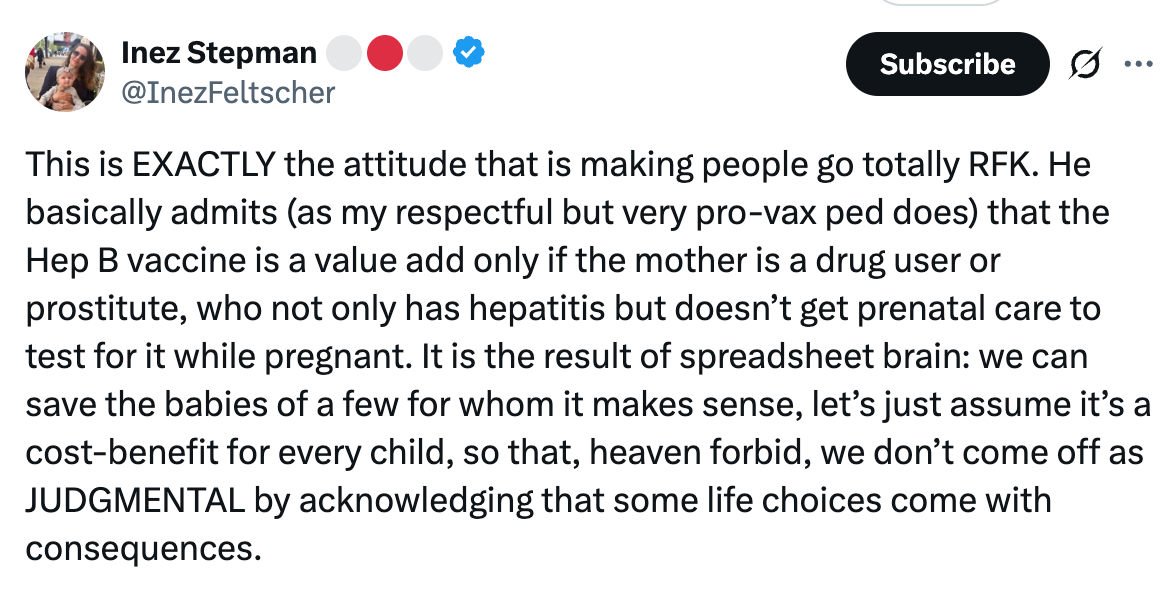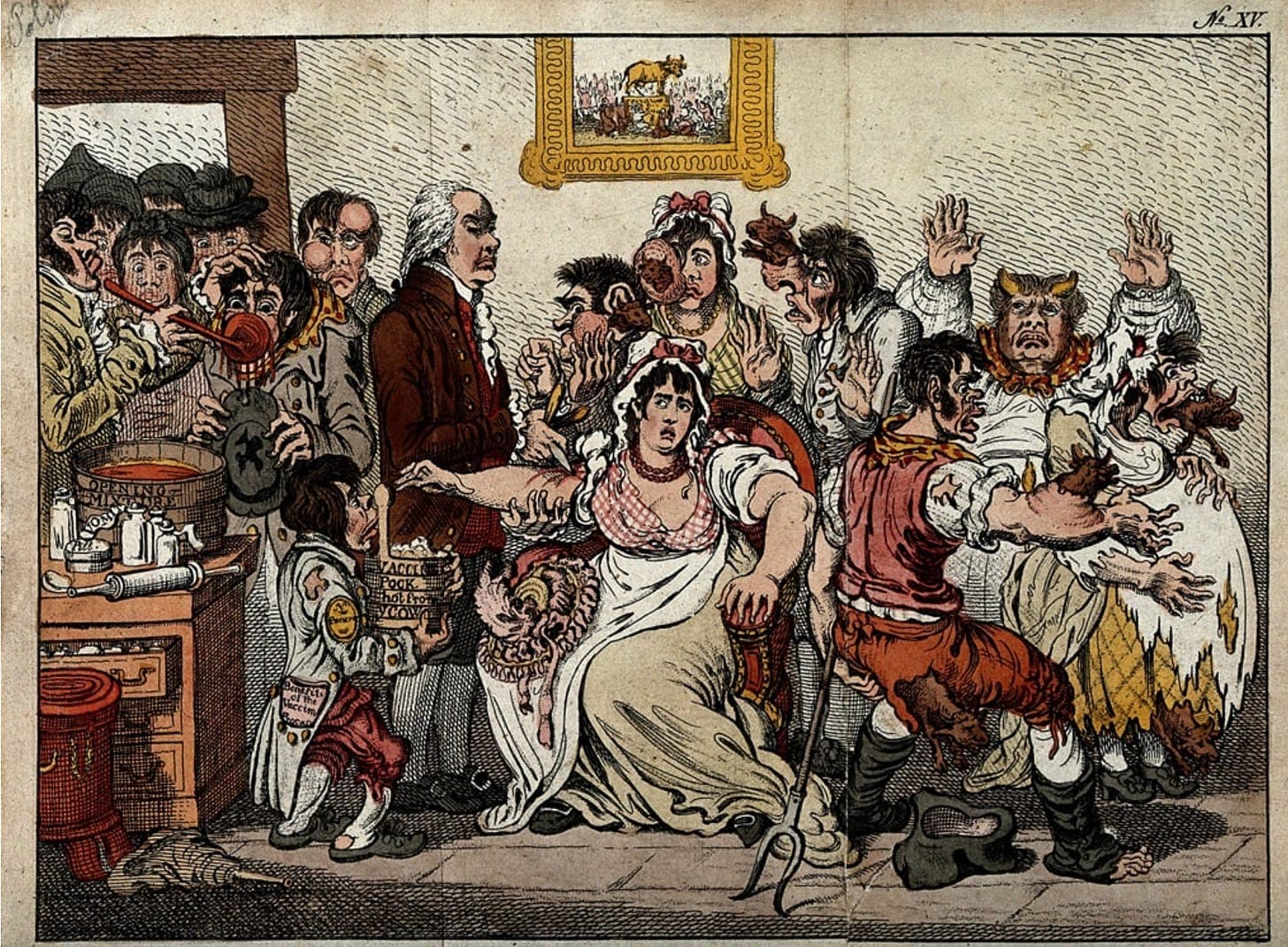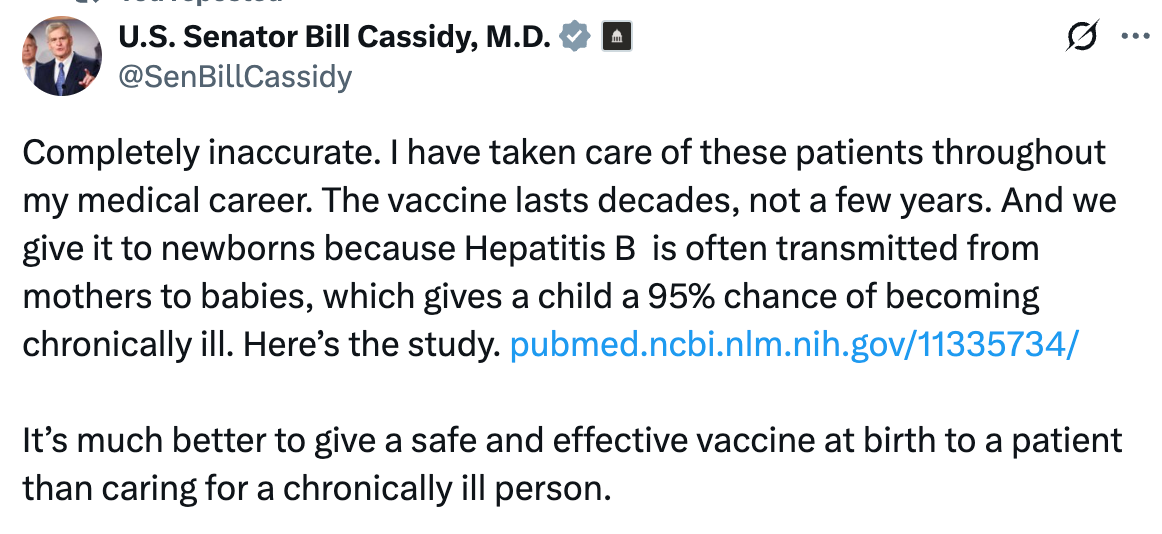Your newborn is not Hepatitis B vaccinated because of wokeness
Being reflexively anti-system is bad
“I am a great negative. I protest. I have the right to say that I do not accept anything.”
(Kirillov - The Possessed)
In Dostoyevsky’s The Possessed, a group of young radicals embrace destruction as an end in itself: “We shall burn everything, we shall destroy everything, we shall let the cry resound: From the ashes we shall build!” But there is no building that follows, only smoke and ruin. In a recent debate with Curtis Yarvin, I argued that his ideology has seeded the same type of nihilism: destroying The Cathedral is not enough. Among rising rates of mental health issues in the youth and a general sense of ennui and lack of purpose that I can sense in my generation, a constructive path forward that avoids devolving into Third Worldism must be carved: a reinvigoration of classical liberalism, I hope.
My points were perfectly illustrated yesterday, when I found out from some of the luminaries of our age that widespread newborn vaccination against Hepatitis B happens because of wokeness. That sounded weird to me, since as a Romanian newborn, I was also vaccinated against Hepatitis B, regardless of my mom’s Hepatitis B status. The policy had been in place since 1995, at a time when Romania was definitely not “woke” (homosexuality, for example, was still illegal up until 2001 in Romania). Could there be another explanation for this state of affairs other than a refusal from health agencies to construct a “whoreness/degeneracy score” and apply it to women before vaccinating their newborns? Or, as Curtis Yarvin put it in a now deleted tweet, a refusal to do some sort of racial screening of mothers?
This situation shows how the illiberal right tends to be innately reactive to whatever happens, as opposed to constructive. They have no agency, they are merely victims (so Nietzschean!): if the “wokes” do something, then the normal response is to become super anti that thing and produce nothing of value instead. Irrationality is defended, as those trapped in a permanent Victim state cannot be expected to use their mental faculties to judge situations on a case by case basis. Vaccination is also a particularly interesting issue because it’s in some ways a crowning achievement of the Enlightenment’s emphasis on science, rationality, and the application of knowledge to improve human welfare. I guess those advocating for a RETVRN to pre-liberal values really mean it and strongly so.
When Edward Jenner introduced the first smallpox vaccine in 1796, he faced widespread resistance. His method involved inoculating people with material from cowpox lesions, and detractors spread rumours that those who received the vaccine would literally turn into cows or grow bovine features. The reluctance to get vaccinated from people of the day is caricatured in drawings like the one below.
Now, getting to the actual debate: we do know that in many other European countries testing for Hepatitis B of the mother is done before vaccinating newborns. However, this does not require any form of racial or “whoreness” screening: you just test every mother and then only vaccinate the babies of those who test positive. There is little connection to wokeness in this approach. But one might still wonder why in the United States all infants are vaccinated.
Having studied medical regulation and written about it, my bet was on some sort of random idiosyncrasy in the system. Medical regulations and systems are often slow and contradictory, not because of woke conspiracies, but rather because bureaucratic processes tend to accrete inconsistencies over time. This is actually a big problem for biotech, especially when it comes to regulatory inconsistency/opacity, which can cause hundreds of millions of dollars lost in revenue, for example if a drug approval is delayed due to manufacturing issues.
I have written about potential fixes to these inconsistency issues (for example, in my piece on how to efficaciously achieve FDA transparency). I wish people spent as much time digging out inconsistent FDA regulations/criteria (you can start with this white paper here) that make the approval of new therapies slow and onerous, as they spend spotting supposed ideological plots in the vaccination system. Oh, how I wish armies of people dedicated themselves to analyzing these much more important inconsistencies to own the libs! But this would, again, require some Nietzchean vitalism from those most obsessed with Nietzsche, some actual desire to constructively and positively impact the healthcare system.
I also reasoned that there is probably no way of really knowing what the ideal schedule for vaccinating against Hepatitis B is and since the system works as it is we might just as well stick to it. But in this case, it turns out there are actually potentially good reasons why universal vaccination for hepatitis B happens.
The core issue is that perinatal hepatitis B infection is uniquely dangerous: up to 90% of infected newborns go on to get chronic infection, which carries high lifetime risks of cirrhosis, liver failure, and hepatocellular carcinoma. Preventing that single moment of transmission at birth can avert decades of downstream suffering and cost. So not vaccinating has a very high potential downside risk and pretty surely no upside potential.
The United States initially tried risk-based approaches, but experience showed that relying on maternal testing and selective prophylaxis left too many babies unprotected. In 1991, the Advisory Committee on Immunization Practices (ACIP) issued its first recommendation for universal hepatitis B vaccination of all infants. In 2005, ACIP went further, recommending that every medically stable newborn receive a hepatitis B vaccine dose within 24 hours of birth, regardless of maternal status. Basically, it was concluded that it was just easier to recommend universal vaccination for everyone. That this is not the result of some refusal to condemn “degeneracy” is clearly showcased by the fact that the 1991 recommendations were supported by both parties with George W Bush Sr for example being very pro-immunization. I am pretty sure Republicans are not a party that has historically been afraid to judge “degeneracy”; on the other hand, pretty much everyone whom I consider a decent human being would agree that it’s better for children to not get liver cancer, regardless of what their parents did. Senator Bill Cassidy himself, a Republican and liver doctor, and someone who has taken socially conservative stances throughout his career, finally declared himself against this entire anti-vaxx non-sense:
This safety-net logic is especially important in the fragmented American health system. Prenatal care, hospital delivery, pediatrics, and public health reporting are often handled by entirely different providers, with no single national electronic health record or centralized tracking system. A woman might be screened for hepatitis B in one clinic, deliver at a different hospital, and bring her newborn to yet another pediatrician. Each handoff is an opportunity for data to be lost or delayed. In countries with unified national health services, selective strategies can sometimes work more reliably. But even in such countries, this is not entirely efficacious: in 2020, among the 25 EU countries with universal antenatal screening policies, only 77% had achieved ≥90% coverage among pregnant women.
Some argue you could simply test mothers right before birth and only vaccinate the babies who need it. In fact, in the U.S. this is recommended if a mother’s hepatitis B status is unknown at delivery: hospitals can run “STAT” tests with results in a few hours. But in practice, this doesn’t fully solve the problem. Testing at the moment of labor is vulnerable to delays in turnaround time, limited lab availability in smaller hospitals or rural clinics, and false negatives if a mother has only recently been infected. Birth itself is also a chaotic, high-pressure moment, where adding another test-result-communication-action chain increases the chance of error. There is also the chance of false negatives. And if results come back too late, you miss the critical 12-hour window in the vaccine is maximally effective.
That is why countries from Romania to the United States adopted a universal birth-dose strategy. It acts as a safety net: every newborn is protected immediately, regardless of maternal records or testing logistics. Now, I am not entirely sure if this is the platonic ideal of a vaccination strategy, but it works pretty damn well and in any case, it does not happen due to wokeness.
Ok but what if I deliberately want to get a whoreness score assigned to every woman at birth?
Edit: It was claimed that an initial version of this post was misleading people into thinking that Hepatitis B is more transmissible than it is. You can see the back and forth here. I have amended my article to make sure that no misunderstanding might take place. All in all, the premise on X was that this was as hard to transmit as HIV, which is not true. Hepatitis B is a virus that transmits via bodily fluids and is much more likely to affect “at risk” populations that engage in risky behaviour. Nonetheless, it is considered one of the most contagious viruses in its class and, as I show below, can affect ~ large parts of non at risk people.
“What is your body count?” — asks the doctor attending to your birth, looming over you. You are stressed, in pain, and can barely think: but this is an important part of defeating wokeness via “whoreness score” pre-screening for Hepatitis B. Now, some might really, really want to embed incel internet discourse into medical practice and instantiate such a reality (would they get the whoreness score qualified as a biomarker under the Biomarker Qualification Program?)
Fine. But even then, I want to explain to these people that this might be bad for THEM, since uncontained Hepatitis B can be bad in the long-run for everyone, not just high-risk populations.
While hepatitis B infections may be concentrated in certain high-risk populations NOW (or those high in degeneracy score), due to widespread vaccination, the virus may NOT stay confined to those groups in the long run. In the end, hepatitis B, given its high rate of infectiousness, might not be something that can be kept neatly contained within a few groups we label as “high risk” if it becomes prevalent enough in the “high risk” groups. And if your “high risk” population is large enough, which in the U.S. it might very well be, it might become an actual widespread problem. Viruses don’t respect categories. They move in quiet, ordinary ways: through families, through partners, through the accidents and medical encounters that touch all of our lives.
Before the universal vaccination recommendations in 1991, a study from 1986 found that 1.5% of white heterosexual students with less than 3 recent sexual partners were Hepatitis B infected. Given that college attendance rates were even lower in 1986 than now, this is a quite highly selected group. In a larger cohort, including those from lower socioeconomic backgrounds, 30% of those with Hepatitis B infection had no known risk factor. In Communist China, a country hardly known for its degeneracy, Hepatitis B used to be endemic, with 10% of the population being infected. This led to the government mandating vaccination at birth. It is hard to estimate exactly how Hepatitis B prevalence would look like in the US today if mothers were tested at birth before vaccinating: changing demographics, transmissibility of the virus, healthcare system logistics and so on, would have to be taken into consideration to propose a better policy. But none of the critics of the current system, which works, is doing this exercise.
A Chinese follower of mine, Dr Dale Wen, who is hardly woke (look at her tweets!), summarized her experience in a tweet copied below.
And she is totally wrong scientifically. Hepatitis B is highly highly transmissible, at least before the vaccine. In 1980s, about 10% of Chinese were carriers. Even though drug use and prostitution were almost unexistent under the communists. My father died from Hepatitis B at age 53. He got it by eating with my uncle, a known patient. When he got diagnosed, my whole family got tested and everyone of us tested positive for antibodies. Meaning we all got exposed but fortunately our immune system fought it off successfully . But my father was not so lucky. There are also academic papers showing toddlers transmit hepatitis B to each other, by sharing saliva. It is the vaccine that changed the tragic situation in China. Today only 3 % Chinese are carriers, despite the fact there are much more drug use and prostitution in China today than in 1980s. Hepatitis B is only transmissable through sex and drug use is a lie pushed by patient activists, because they don't want to be discriminated. Fortunately it has largely become true because most people are vaccinated. If most people are no longer vaccinated, it will no longer be true, as the case in 1980s China.
She also provided some links to papers showing how easily transmissible hepatitis B can be: one study found a case of transmission between toddlers biting each other in daycare, and another one found horizontal transmission within a family with everyone getting hepatitis B. Because I have been accused of misrepresenting these studies, I want to make it clear these are not the most common ways of spreading the virus: risk increases massively for those who engage in high levels of sexual activity with many partners and so on. But it’s much more contagious than HIV and we probably do not fully know all the ways in which it can spread.
As an anecdotal story, I know of a family in Romania (where baseline rates were higher in the 90s) who was upper middle class and where everyone ended up with Hepatitis B. One of the parents died in his 50s due to cirrhosis.
Overall, if something ain’t broke, don’t fix it. If someone has a concrete policy proposal, that takes into account all the caveats of changing what we know has massively reduced liver cancer in children and protects everyone from possible endemicity, they should write up a detailed memo, instead of screaming about degeneracy on X or justifying broad anti-vaxx sentiments.







This is one of reasons to make the vaccine universal. The virus is a lot more common and communicable than most people think and a lot more deadly. The objection to it sounds reasonable but the vaccine is quite safe it would seem and the disease is not safe at all!
Years ago, I got into an argument with a woman who was against most vaccines, but particularly the HepB vaccine. She insisted that it was unnecessary because it was an STI. When I pointed out that it's pretty easy to transmit and that a significant amount of transmission in China in between members of the same household, she insisted that didn't matter because we were in America not China.
Which is true but irrelevant. It's entirely possible that here in America, someone in the household is infected. We didn't start screening blood until the late '60's early '70's so one of the grandparents might be infected an have no idea. Given that little kids really don't understand hygiene, if one of the kids they play with or got to preschool with has it, the kid could contract it. And a toddler on interferons sounds like the worst circle of hell.
Viruses are just viruses. They don't have brains so they can't care if you're being virtuous. They evolve to be transmitted. Getting sick from a vaccine preventable infection because your parents thought that skipping the vaccine would keep you on the path of virtue is a real tragedy. And the kid would have every right to be angry at the parents for allowing that to happen.